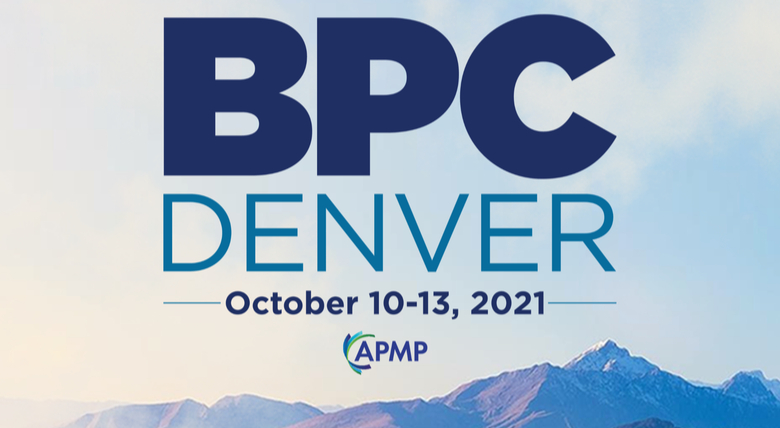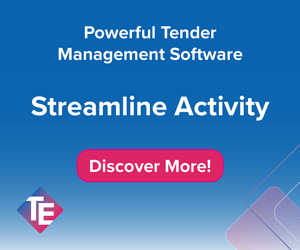For the past three days, BPC attendees have reconnected with each other in person, gained new insights from industry experts, been inspired (and inspired others) through storytelling — and even took a few selfies with the Big Bid Bear. In case you missed it, here are 11 key takeaways from Tuesday and Wednesday’s educational sessions.
Session: Managing Proposals and Business Development Through an Acquisition
Presented by Melissa Willett, CP APMP, Senior Proposal Coordinator at Bartlett & West, Inc.
Key Takeaway
“Most of us who work in proposals appreciate a schedule filled with submission and review deadlines. We’re great about securing our content and, at times, can be a little rigid. However, during an acquisition, we have to realize we are one piece of a larger process. Our priorities may conflict with others’ priorities. Instead of feeling frustrated, we can feel empowered to leverage our creativity to find stopgap solutions. By identifying temporary solutions, we can continue doing our best work, building relationships and moving our company forward until a permanent solution can be determined.
“When there are things outside of your control (like an acquisition), don’t stress out about them. Instead of focusing on what’s not being done, focus on what’s inside your circle of influence. By being resourceful and creative, we can find solutions that can solve our immediate need until the overall issue can be addressed.”
Session: The Art of Storyboarding
Presented by Rebecca Link, Director of Proposal Operations at ActioNet, Inc.
Key Takeaway
“The biggest mistake teams make when storyboarding is that they don’t leave enough time to complete the activity, so they don’t do a thorough enough job. This leads to poorly written content with unclear messaging and little value.
“Storyboarding is a pre-proposal activity. Once a green light to pursue has been given and you have your capture plan with black hat, you are able to begin developing your storyboard outline.”
Session: Transitioning from Capture to Proposal
Presented by Bruce Morton, Capture Management Director at SAIC
Key Takeaway
“To enable a successful transition from capture to proposal, the capture manager passes a blue baton to the proposal manager for execution. The baton includes the win strategy, win themes, teaming and rationale, offer design, pricing strategy, etc. If a capture manager does not deliver a blue baton, the probability of win is significantly decreased.”
Session: 9 Essential Rules for a Small Business Prime Bid
Presented by Tom Giroir, Owner & CEO at TMG International Consulting
Key Takeaway
“The bid program manager that you submit (bid) in your proposal to the government customer is crucial to your successful proposal. Does the government customer know your bid PM? Will they be excited to see that you bid someone they actually know, have respect for and confidence in? Your government customer will spend the next five years working daily (frequently hourly) with this PM, striving for success. Do they believe your bid PM will help them achieve success as a government PM? Or will they wonder, ‘Who is this person?’ and lack personal knowledge or awareness? Personal knowledge, awareness and respect for an individual clearly drives confidence in a bid PM. This is an incredible boost for your proposal! It is difficult to communicate confidence and awareness via a written proposal, when a prior relationship can be an incredible foot in the door.”
Session: Spotting Red Flags in RFPs
Presented by Ioana Alexandru, Proposal Manager at Shipley Associates
Key Takeaways
“We often get into work mode as soon as the RFP drops, thinking that every second counts, and a lot of time is spent on putting together the strategy for the response, the assignments, the timeline and trying to make all activities fit into whatever time we were given by the client. The no-bid decision might come late into the process, after important resources were already invested in it, which is a costly mistake. This is why thinking critically and thoroughly assessing the documents should remain at the starting point of each proposal effort.
“Unfortunately, there isn’t a one-size-fits-all technique for determining whether a deal should be a no-bid, but this decision should take into consideration elements of the RFP, as well as your relationship with the customer, the client’s perception of the organization and your relative position compared with the competition.”
Session: Contractor Team Arrangement (CTA) Strategies for the Proposal Professional
Presented by Jeff Shen, President at Red Team Consulting
Key Takeaway
“For small business primes pursuing small business set-asides, the updated SBA regulations from 2020 now say federal agencies ‘must’ consider the capabilities and experience of each first-tier subcontractor that is part of the team and experience of the small business prime contractor. That opens the door for small business primes to claim experience from identified ‘first-tier’ small business subcontractors as that of their own.
“The majority of teaming agreements (TA) today are not enforceable in a court of law if they are broken or not adhered to by the agreement’s terms and conditions. Most TAs are simply agreements to work in good faith to negotiate a separate agreement. However, there is language you can put into TAs that will strengthen the agreement (i.e., duration, penalties and damages, etc.) and more likely to be enforced in the case of a dispute.
“There are often multiple ways to team when pursuing any federal contract. This includes:
- Prime and Sub Arrangements (best and preferred in most competitions with less regulatory hurdles)
- Small Business Joint Ventures (best for combining the capabilities, certifications, systems and experience of qualified small business firms)
- Mentor-Protégé Joint Ventures (best when the experience and capabilities of a larger mentor firm are critical for a pursuit).”
Session: Adapting the Proposal Process to Unique Environments
Presented by Alyssa Kolski, Proposal Education Lead at Sandia National Laboratories
Key Takeaway
“While most of us use APMP best practices to develop our proposal management processes, there are times when we have to adapt some recommendations to best fit our specific needs. Managing proposals in unique environments is like baking bread at a high altitude. The tools, ingredients and methods for proofing and baking each contribute to our success, and sometimes we need to adjust the recipe to work in our specific environments.”
Session: Digital On-Demand: Transforming Your Pitch with Multimedia and Interactivity
Presented by Daniel Walker, Proposal Manager at PwC
Key Takeaway
“Digital can be scary, but it’s necessary to compete and, even with a limited budget and time, you can create a great digital customer experience. Start by thinking about how your customer consumes information, then think of one thing that can make that experience easier for them. Maybe it’s adding an interactive table of contents or recording a quick video to show off a key stakeholder. After this, explore low-cost, off-the-shelf tools to add in this one element.”
Session: Get More than 24 Hours in a Day!
Presented by Donna T. Hamby, CP APMP, Customer Success Manager at OneTeam
Key Takeaway
“We really can’t get more than 24 hours in a day, but we can get more from 24 hours in a day by:
- Eliminating time wasters
- Planning early and avoiding problems
- Reducing chaos in the process
- Implementing automation
- Looking for double-duty solutions.”
Session: APMP: The Association for Proposal Mentoring Professionals
Presented by Heather Finch, Team Leader of Proposals at The Guardian Life Insurance Company of America, and Sheri Lytle, CF APMP, Proposal Consultant at Kelly Services, Inc.
Key Takeaway
“You don’t need a formal program or to wait until the beginning of the new year to get a mentor. Just find someone with similar values and a working style you admire and ask them if they would be interested in mentoring you. The same goes for people who want to mentor others!”
Session: Structured Review Process to Produce Compliant and Compelling Proposals
Presented by Christine Sowinski, MBA, CP APMP, Proposal Manager at Kiewit
Key Takeaway
“Take time to review proposal deliverables and processes throughout the lifecycle. After your next proposal is submitted, schedule an internal lessons-learned review meeting and discuss what went well and what can be improved, including these questions: Were our tools helpful? Were roles and expectations clear? Were reviews effective?”
Look back at the BPC 2021 conversation on LinkedIn and Twitter using the #ProudToBeAPMP hashtag.



Join the Conversation